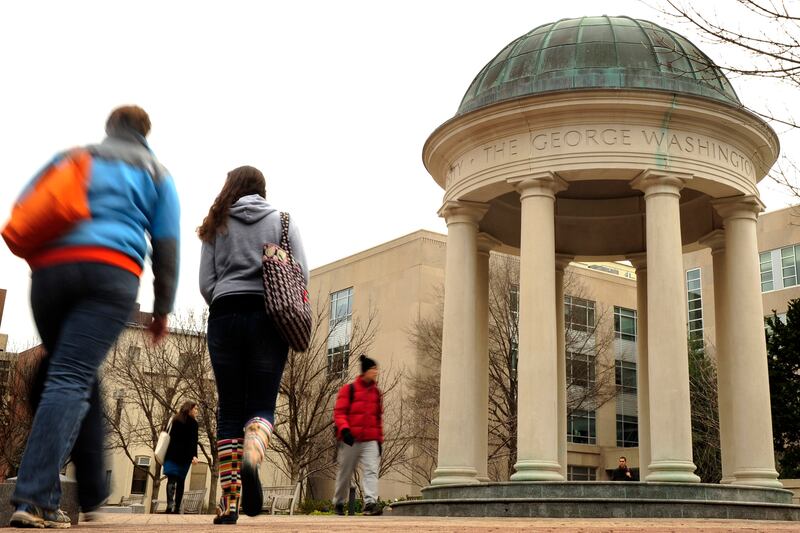Soft job market got you down? Tired of your boss’s crap? Looking for a Plan B with the potential for big money, nice perks, and travel to exotic locales?

Try this on for size: George Washington University Graduate School of Political Management just announced that it is launching a new masters program in international lobbying. Yep, you read that right: The glamorous world of global influence peddling just got its own syllabus.
Now, I realize many of you may be asking: Why the hell would someone go to school to become a lobbyist? Reasonable question. After all, the popular conception of lobbying jobs is that they are where one lands—softly and richly—after years, if not decades, of toiling in the field of public service as either a staffer or an actual elected official. Former Senate buds Trent Lott and John Breaux didn’t build a successful lobbying partnership, much less have it snapped up by K St powerhouse Patton Boggs, by satisfying some grad school curriculum. Likewise, former Rep. Billy Tauzin didn’t enjoy five highly lucrative years as head of PhRMA because of a lousy diploma. Nope, these guys worked hard, climbed the ladder, and then cashed out big time, just like legions of their colleagues before and since. (Not that all of these folks register as official lobbyists, mind you, but that’s another question entirely.)
As for Hill aides, on really grim days, the only thing that keeps some of these poor bastards from kirking out is the promise of one day trading in their high-stress, not-terribly-remunerative staff jobs dealing with arrogant, abusive lawmakers for vastly higher-paying, lower-stress lobbying jobs dealing with arrogant, abusive lawmakers. It’s a small shift, but an important one.
But let us set aside the question of who has earned the right to be a highly paid influence peddler and look at the situation from a purely practical standpoint. Considering the highly specialized and personal nature of lobbying, the idea of teaching its esoteric subculture and ritual dances in some bloodless classroom (or stranger still, through GW’s online-only version of the program) sounds dubious—like hosting a lecture series on how to weather a political scandal or overthrow a government. Theoretical instruction has its value, but in certain situations there’s no substitute for intimate, hands-on knowledge of the process.
That said, there are many legal niceties and mechanical details to learn. To this end, GW has long offered a degree in political management that includes lobbying tips of the trade. GW isn’t alone in its quest either: Just up the road, American University offers two-week intensive lobbying workshops through its Public Affairs and Advocacy Institute, formerly known as the Lobbying Institute. For aspiring K Streeters who lack the advantage of having served as Senate Majority Leader or House Speaker or merely as a lowly staffer on the Ways and Means Committee, why not get all the extra help you can? Consider it a down payment on your future 650i convertible.
Of course, if effectively petitioning one’s own government is a delicate, mysterious process, just think how much more dizzying it must be to try and sway decision makers in China or Brazil or the UAE. (How exactly does one lobby an emir?) Admittedly, most countries don’t regulate the wild world of lobbying as heavily as the U.S. (for all the good it does), but that doesn’t mean you can’t land in a heap of trouble if you don’t know the basic dos and don’ts of a particular culture. When, for instance, a tech giant like Google or Facebook is looking to beat back tougher privacy protections being floated in the EU, they will want top-flight influence peddlers who know all the angles. (Quick! Name the top five beer bars in Brussels—where, it so happens, there are approximately 10,0000 registered lobbyists.) This is where GW’s new program aims to grease the skids at least a bit.
As the university’s web site explains, the new “Advocacy in the Global Environment” degree requires 39 credit hours, including four far-flung “Global Perspective Residencies.” (Participants can choose from five study locales: Brussels, Istanbul, Hong Kong, Sao Paolo, and Washington, DC.) Through such “in-region” immersion, GW promises, “students will get a real sense of how governments are influenced and will have the ability to network with top political governmental, media and business leaders.”
Schmoozing with foreign muckety-mucks for credit hours? Is this a great country or what?
But while I can kind of see the logic behind creating an army of degree-wielding global lobbyists, I can also see the peril. As a long-time Washingtonian, I know many lovely people who have gone into lobbying. Seriously. Total sweethearts. That said, the profession is not held in especially high esteem by the general public. When asked to rank various fields in terms of “honesty” and “ethical standards,” Americans put lobbyists dead last, behind used car salesmen, journalists, lawyers, and, yes, even members of Congress. Similarly, when asked which major U.S. entities have too much power, Americans put lobbyists at the top of the list, above major corporations, banks, and the federal government.
In short, if you were trying to pick an American product likely to piss off the rest of the world, destroy our national reputation for all time, and possibly touch off a global conflagration, lobbyists would be a solid bet. Bad enough we’ve flooded the planet with Big Macs, Marlboros, and Miley Cyrus. Are we really gearing up to unleash a pack of highly schooled Jack Abramoffs on it as well?






